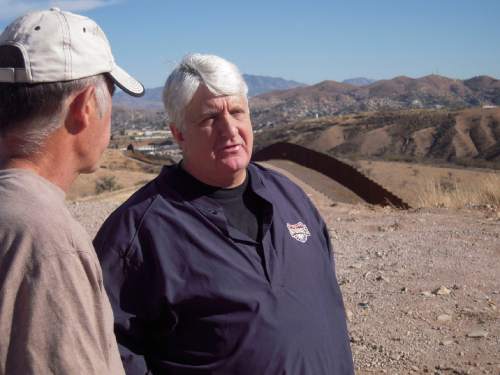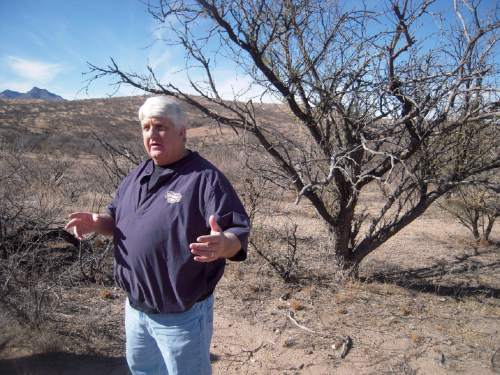This is an archived article that was published on sltrib.com in 2015, and information in the article may be outdated. It is provided only for personal research purposes and may not be reprinted.
Washington • Language quietly tucked into a Republican border-security bill advancing in Congress would allow the border patrol to ignore environmental laws within 100 miles of the U.S.-Mexico line.
The measure is pushed by Utah Rep. Rob Bishop, chairman of the House Natural Resources Committee, who has argued for years that restrictions on public lands along the border hamper federal agents from stopping border crossers and drug traffickers. Democrats and other critics say the effort is a ruse to gut environmental laws in a large swath of America.
The bill, which the House is likely to vote on next week, would allow the Border Patrol to waive federal rules to build roads or surveillance towers and allow motorized vehicles in protected national parks or wilderness areas. A companion bill was introduced in the Senate this week.
Rep. Raul Grijalva, D-Ariz., says the measure is attempting to solve a "fantasy" problem that the GOP has constructed and he fears this may be only the beginning of rolling back environmental laws.
"This is to establish a precedent that those laws can be waived, ignored, repealed, and once that precedent is established, the foot is in the door to get rid of those laws everywhere else," Grijalva said in an interview. "That's not a conspiracy theory; that's what they're trying to do."
Bishop, who waived a hearing on this iteration of the measure before the Natural Resources Committee, says that border agents are hamstrung in their ability to pursue border crossers or patrol areas teeming with drug traffickers because of limits on motorized vehicles and long-delayed approvals for surveillance towers.
He cites government studies showing the restraints federal agents face in doing their jobs in public lands along border areas, such as being forced to patrol on horseback except in case of emergency.
"Those who are opposed to it, saying I'm only trying to get rid of environmental rules, are hiding their heads in a hole and not facing reality," Bishop said Friday. "Those rules prohibit border security, pure and simple. And that's why this has become an easy sell; it's not even the focal point of the bill."
Bishop's language has been included in the last two GOP border security bills — neither of which passed the Senate — and were automatically included in the newest measure, the chairman said. He says the Senate should, and likely will, take up the bill and President Barack Obama would be foolish to veto it.
"If he does veto it certainly will not be only for this portion of it," Bishop said. "And if he wants to actually solve the problem, he won't issue a veto."
The White House last year threatened to veto a bill that included similar language and mentioned the environmental laws as one of the reasons Obama would strike it down.
Homeland Security Secretary Jeh Johnson said this week that the legislation was "not a serious effort at legislating border security — and its authors know it." He said the bill sets mandatory and "highly prescriptive standards" that the Border Patrol regards as impossible to achieve and that it "politicizes tactical decisions."
Environmental groups say the provisions at issue create a quasi-Constitution-free zone where federal agents can run roughshod over laws they don't like.
"We feel that it's ineffective in solving the actual problems on the ground," says Mike Quigley, The Wilderness Society's Arizona state director. "And we think it undermines both the rule of the law and decades of conservation protections that America has put forward for special places in the southwest."
Already the departments of the Interior, Homeland Security and Agriculture have signed an agreement to work together to halt border crossers while protecting sensitive areas.
But several border-patrol officers have testified before Congress that Bishop's effort to waive environmental laws is needed.
The National Association of Former Border Patrol Officers' George Zachary Taylor told a joint Oversight and Government Reform and Natural Resources subcommittees in 2011 that, if officers can't access areas near the border, they can't patrol or secure the U.S.-Mexico line.
"Limited-access areas, including wilderness and refuge areas, present a greater likelihood that agents will encounter armed criminals who will not hesitate to fire upon them and that the probability that if anyone is seriously injured they will surely die before that injured person can be safely transported or evacuated because of access issues," Taylor said.
The House is expected to bring up the border bill on Monday when it reconvenes.





